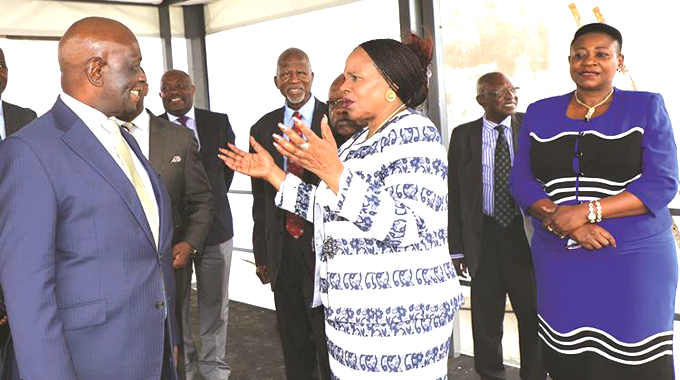Govt challenges ZMMT to move with the times

Freeman Razemba Senior Reporter
GOVERNMENT has challenged Zimbabwe Mass Media Trust (ZMMT) trustees to appreciate that the media landscape has been changing over the years, hence they should adapt to match the new developments for them to remain relevant and useful to media companies.
The trust, which had been dormant for almost 20 years, was last month resuscitated by President Mnangagwa who appointed six trustees.
The appointment of the six was in accordance with the ZMMT founding Deed of January 29, 1981, and its amendments.
Veteran lawyer and former Trust chairman, who is also former Zimpapers chairman, Mr Honour Piniel Mkushi, chairs the trust.
The other members include current Zimpapers board chairman Mr Tommy Sithole, Ms Patience Gawe, former police spokesperson Ms Charity Charamba, historian and educationist Mr Pathisa Nyathi and former Midlands State University Vice Chancellor Professor Ngwabi Bhebe.
The Trust held a meeting with Information, Publicity and Broadcasting Services Minister Monica Mutsvangwa in Harare yesterday.
She urged the trustees to work with the ministry to shape a secretariat that will run their affairs on a day-to-day basis.
She said the nation looked upon them to make ZMMT and it’s companies a success.
“ZMMT and its companies are a national asset,” said Minister Mutsvangwa. “You are thus, as its board members, expected to protect the national interest. Always remember that the media companies have boards that are in place and yours is to represent the shareholder.
“You stand between Government and the companies and you are expected to shape and guide their operational strategy as deduced from Government policy and thrust.”
Minister Mutsvangwa said the responsibilities of the trust were to ensure that provisions of the Notarial Deed of Trust were upheld by the subsidiary companies, to offer oversight to the management of the mass media companies in the trust of the shareholders and to play a fiduciary role by acting in the best interest of the people of Zimbabwe and Government.
Others are to act as a buffer between the Government and media companies, to provide a balance of conflict of interests between media companies and their shareholder and to uphold the information policy by ensuring that the country’s media are free to fulfil their traditional role of educating, entertaining and informing Zimbabweans with a goal that sums their aspirations towards building a health democracy.
Other responsibilities of the trust include ensuring that the media, as an instrument of change, is a tool to transform the public, bridging the gap and establishing meaningful dialogue between the different sectors of society in line with the national vision of attaining an upper middle income economy by 2030. It must also ensure that the subsidiaries operate profitably.
ZMMT was formed in the early 80s following a donation from the government of Nigeria and at that time the media sector ownership was dominated by the exiting Rhodesians.
The donation enabled Zimbabweans to have control of their own voice.
“It is unfortunate that in 2001, the then Minister of Information decided to terminate the operations of the Trust by removing the board from office,” said Minister Mutsvangwa. “From then until now, a period of 19 years, the companies under ZMMT operated without a Trust. The companies under ZMMT operated without a ‘parent’ and had mixed fortunes.”
Minister Mutsvangwa said Zimpapers had grown into a huge multimedia company, listed on the Zimbabwe Stock Exchange, with interests in printing, publications and broadcasting and was a major player in the media industry.
She said the going had not been smooth for Kingstons Holdings, which had interests in textbooks and stationary sales, arts and real estate.
“Government decided that all loss making parastatals and companies should be closed and Kingstons is included on the list.
“The plan that is under consideration is to liquidate five non-performing companies under Kingstons and retain only two: Kingstons Limited to continue with the Kingstons business mandate, and Kingstons Holdings, which runs two radio frequencies that were operationalised with assistance from Zimpapers.”
On New Ziana, Minister Mutsvangwa said Government decided that there were some roles that could be reconfigured to enable it to speak to modern technological developments that remain critical to Government communication.
She urged the trust to give leadership to the companies so that they become players in the media sector as information contributes immensely to nation building and development.
“Your terms and references are in the founding Trust Deed and its 199 Amendment,” said Minister Mutsvangwa. “I urge you to read these documents and ensure that you lead the company in accordance with the laid down terms.
“The Trust Deed and its amendment recognises the Government of the day as the main representative of the people of Zimbabwe in the Mass Media Trust.
“This is why the sitting President was given power to resuscitate the Trust in the event that it ceases operations for whatever reasons. After the Trust stopped from operating in 2001, the President Cde ED Mnangagwa decided to appoint you so that the Trust can be given life again in the interests of improving governance, transparency and freedom of expression.”
In an interview, Mr Mkushi said they had a fruitful meeting with the Minister, adding that they were ready to deliver.
“We had a fruitful, inaugural meeting with the Minister for Information and the six trustees were all present,” he said. “The Minister emphasised that the Trust was established to look after the media interests of the nation as a whole.
“Minister Mutsvangwa also added that the trustees were appointed specifically because of their background and experience and their appreciation of the importance of the freedom of the press while they also appreciate the patriotic interest in ensuring that the press operates responsibly.”









Comments